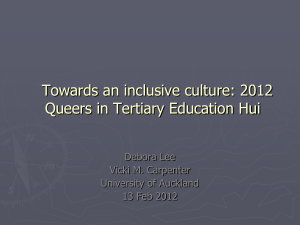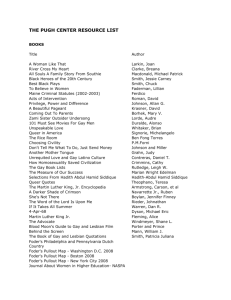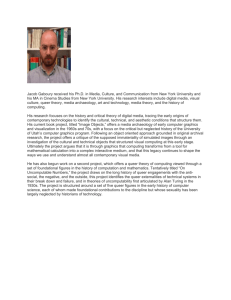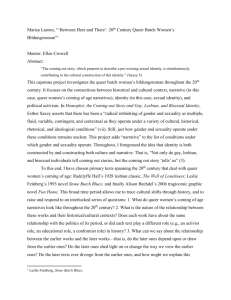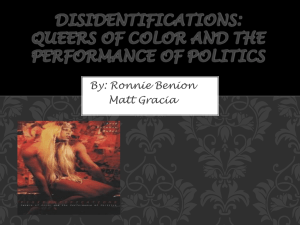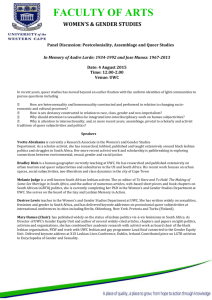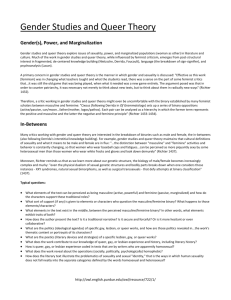Oberlin College
advertisement
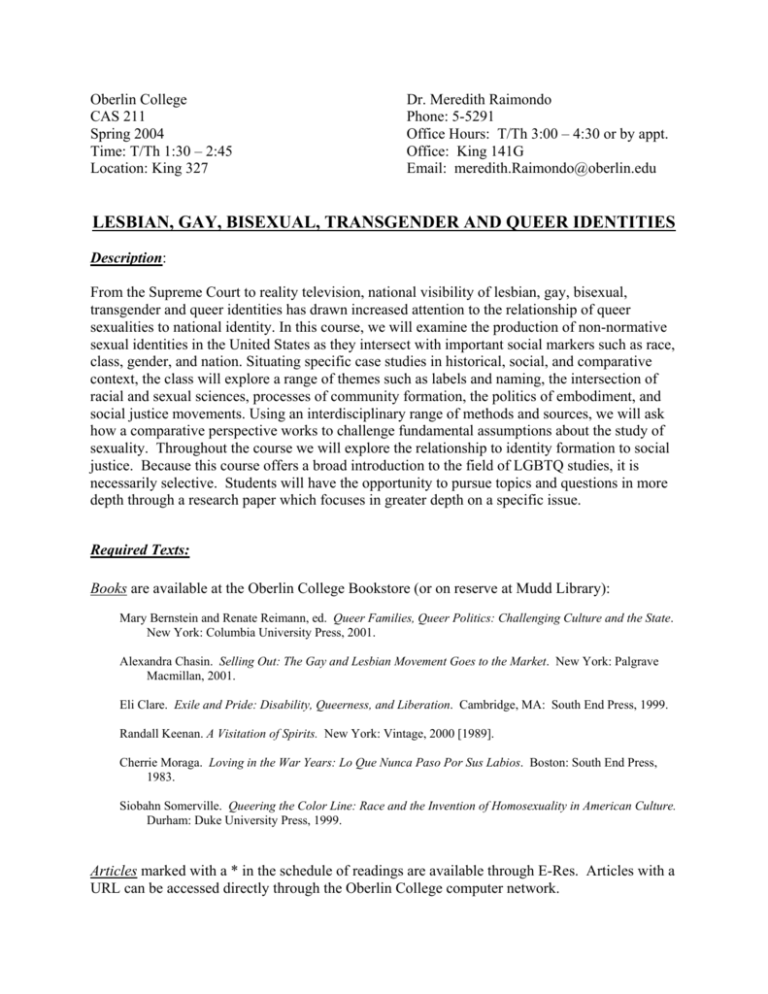
Oberlin College CAS 211 Spring 2004 Time: T/Th 1:30 – 2:45 Location: King 327 Dr. Meredith Raimondo Phone: 5-5291 Office Hours: T/Th 3:00 – 4:30 or by appt. Office: King 141G Email: meredith.Raimondo@oberlin.edu LESBIAN, GAY, BISEXUAL, TRANSGENDER AND QUEER IDENTITIES Description: From the Supreme Court to reality television, national visibility of lesbian, gay, bisexual, transgender and queer identities has drawn increased attention to the relationship of queer sexualities to national identity. In this course, we will examine the production of non-normative sexual identities in the United States as they intersect with important social markers such as race, class, gender, and nation. Situating specific case studies in historical, social, and comparative context, the class will explore a range of themes such as labels and naming, the intersection of racial and sexual sciences, processes of community formation, the politics of embodiment, and social justice movements. Using an interdisciplinary range of methods and sources, we will ask how a comparative perspective works to challenge fundamental assumptions about the study of sexuality. Throughout the course we will explore the relationship to identity formation to social justice. Because this course offers a broad introduction to the field of LGBTQ studies, it is necessarily selective. Students will have the opportunity to pursue topics and questions in more depth through a research paper which focuses in greater depth on a specific issue. Required Texts: Books are available at the Oberlin College Bookstore (or on reserve at Mudd Library): Mary Bernstein and Renate Reimann, ed. Queer Families, Queer Politics: Challenging Culture and the State. New York: Columbia University Press, 2001. Alexandra Chasin. Selling Out: The Gay and Lesbian Movement Goes to the Market. New York: Palgrave Macmillan, 2001. Eli Clare. Exile and Pride: Disability, Queerness, and Liberation. Cambridge, MA: South End Press, 1999. Randall Keenan. A Visitation of Spirits. New York: Vintage, 2000 [1989]. Cherrie Moraga. Loving in the War Years: Lo Que Nunca Paso Por Sus Labios. Boston: South End Press, 1983. Siobahn Somerville. Queering the Color Line: Race and the Invention of Homosexuality in American Culture. Durham: Duke University Press, 1999. Articles marked with a * in the schedule of readings are available through E-Res. Articles with a URL can be accessed directly through the Oberlin College computer network. CAS 211 2 Course Policies: Discussion: The academic study of sexuality often addresses issues that are controversial or which raise strong personal feelings. There are few “right” answers to the questions we are exploring; my goal in this course is to provide you the skills to express effectively your own arguments and positions. It is therefore critical that everyone commits to making this classroom a space for the honest and open expression of difference. Learning from people who do not share your views can be a challenging but invaluable experience. I ask that each member of the class commit to responding to carefully thought ideas and questions with patience and respect. Reading: It is important to cultivate the skills that allow you to manage lengthy reading assignments. Do not try to read every word; read for the key arguments, methods, and sources. We will discuss strategies for being an effective reader in class. If you find you are having trouble finishing the reading, please see me so we can identify effective strategies for completing the assignments. Format: Written assignments should be typed/word-processed, double-spaced, use a standard font type and size (generally 12 point, Times New Roman or the equivalent), and include your name, the date, and page numbers. Papers must be stapled—do not turn in loose pages. Please be sure to proofread carefully for style and grammar before you submit written work. Papers that do not conform to formatting direction may be given an addition 1/3 of a grade penalty. Late Policy: Course assignments must be submitted on time. Papers due in class must be turned in at the start of class—if you arrive late, the paper will be considered one day late. I will deduct 1/3 of a grade for each day (24 hours) an assignment is late (i.e., from B+ to B). Late papers may not receive written comments. Please save your work often to avoid computer-related disasters and be sure to allow sufficient time to print in case of technical difficulties. Requests for extensions must be submitted in writing (email is fine) at least twenty-four hours prior to the assignment due date. Generally, extensions are only available for extraordinary circumstances. If you have received an extension, you must attach a written or printed statement of the new due date to which we agreed to the assignment. Honor Code: This course will follow the policies described in the Oberlin College Honor Code. Be sure to cite the work of others to preserve intellectual integrity and avoid plagiarism. I encourage you to provide help and resources to each other, but the final product should be your own work. If you wish to acknowledge significant ideas contributed to your paper by a class member, you may cite that person. If you have any questions about citation or the relationship of the Honor Code to your work in this course, please let me know. For more information on the Honor Code, see http://www.oberlin.edu/students/student_pages/honor_code.html. Students with Disabilities: If you need disability-related accommodations in your work for this course, please let me know. Support is available through Student Academic Services—please contact Jane Boomer, Coordinator of Services for Students with Disabilities (Room G27 Peters Hall, ext. 58467) for assistance in developing a plan to address your academic needs. CAS 211 3 Assignments: 1. PARTICIPATION (10%): In order for our time in class together to be as productive as possible, you will be expected to contribute to three areas as follows: Attendance: This course includes significant discussion of assigned materials; therefore, your consistent attendance is required. After two absences, additional absences will generally lower your final grade in the course. In case of illness or personal emergency, absences may be excused through a doctor or dean’s note. Out of respect for your classmates, please be ready to begin work at the scheduled start time. Be aware that significant lateness will be counted as a missed class. Discussion: Your thoughtful spoken analysis and active listening will be a central component of your work in this course. If you are uncomfortable speaking in class, please come and see me and we can discuss strategies for your participation. I expect everyone to commit to making this course a space in which people can exchange and examine ideas respectfully. The goal is not for everyone to agree, but for everyone’s ideas to be heard and considered. We will discuss course members’ goals and expectations for class discussions together during one of our first meetings. In-class Activities: In-class activities may include discussion in small groups, writing assignments, or other collaborative work. These assignments will not be graded but must be completed. 2. ESSAY #1 (20%). 4 – 6 pages. Due March 1 at 4 p.m. to King 141-G. Steven Epstein writes that “these sexual identities are both inescapable and transformable” (147). Drawing on the readings you have completed for this class so far, explain what you think he means by this characterization of identity. Do you find this definition of identity useful, or would you change elements of it? Further suggestions and instructions for answering this question will be provided in class. 3. ESSAY #2 (20%). 4 – 6 pages. Due April 26 at 4 p.m. to King 141-G. Drawing on the readings you have completed so far in this course, answer the following question: How does a focus on LGBTQ identities help or hinder the achievement of social justice? Hint: This is a very broad question, so the most productive answers will necessarily narrow it in specific ways. On what aspect/element of LGBT identities will you focus? How will you define social justice? You might choose a specific case study here like medical discrimination, racism in queer communities, or the normalization of family forms. Further suggestions for answering this question will be provided in class. 4. REASEARCH PROJECT (40% total). The research project is designed to allow you to pursue a specific interest in more depth. Projects must engage in some way with the concept of LGBT identities and utilize primary and secondary research. More detailed instructions will be provided in class. CAS 211 4 a. Proposal (5%). 1 – 2 pages. Due March 11 at the start of class. Describe your topic and identify one or more questions you hope to answer through your research. Why does this topic interest you and how does it relate to the themes of the course? Proposal should include a brief annotated bibliography of 3 – 4 books or articles (at least two secondary). b. Initial Draft (10%). [Length: The final draft will be 8 – 10 pages; initial drafts must be a minimum of 6 pages]. One copy is due to me on April 12 at 4 p.m. to King 141-G; one copy is due to your peer editor in class on 13. This draft must include all of the necessary sections of the argument (introduction, body, and conclusion) and offer in-depth analysis of specific sources. It may not be in outline form or contain free writing/brainstorming. In addition to receiving a grade and comments from me, you will receive feedback from a peer editor. c. Peer Editing Assignment (5%). Two copies due April 15 at the start of class. Specific instructions will be distributed in class. d. Final Draft (20%). Due May 13 at the start of class. When you turn in your final draft, you must submit the rough draft with my comments as well as your peer editor’s comments. 5. BLACKBOARD THREADED DISCUSSION ASSIGNMENT (10% total). This class will continue its conversations electronically using Blackboard. There are two parts to this assignment: a. Weekly Posts. You are required to post a minimum of two times each week for ten week for a total of 20 posts. You may skip any two weeks of your choosing. You will not receive credit for more than two posts a week, though you should feel free to participate in the conversation as often as you like. Please read the entire board before you post. If you are responding to a previous post, please include your response in the appropriate thread. If you are beginning a new topic, please start a new thread. Be sure to post to the correct folder for each week; if you want to continue a conversation over from the previous week, please start a new thread in the appropriate folder with a brief summary of the issues you wish to pursue. You may post on any subject related to the class as long as you offer a clear argument or question and support it with specific evidence from course materials. Approximately length should be one well-thought paragraph. The best posts will engage directly with other poster’s thoughts and ideas. I expect that electronic discussions will be conducted with the same respect and active listening as in-class discussions. This space is not intended for venting, but rather for thoughtful discussion of ideas that includes respectfully expressed differences of opinion. Posts will be graded credit/no credit. b. Final Assessment. 3 – 4 pages. Due May 16 to King 141-G. A brief paper assessing your participation in the Blackboard threaded discussion that identifies your key questions, interests, and arguments. Further instructions will be provided in class. CAS 211 5 Summary of Deadlines: Twice a week Mar 1 Mar 11 Apr 12 April 15 Apr 26 May 13 May 16 Blackboard Threaded Discussion Essay 1 Preliminary Research Proposal Initial Draft Peer editing response Essay 2 Final Draft Blackboard Final Assessment Summary of Grading Policy: Participation………………….10% Blackboard Participation..........10% Essay 1………….…………….20% Essay 2………….…….............20% Proposal…………………….…..5% Initial Draft. ………..................10% Peer Edit………………………..5% Final Draft………………..……20% Schedule of Readings: (This schedule may change; if so, you will be informed in advance.) Desiring Selves: Sexualities, Identities, Subjectivities T Feb 10: Introductions Th Feb 12: Identity and Belonging: ·José Quiroga, “Latino Cultures, Imperial Sexualities,” 191 – 226* ·Cathy Cohen, “Punks, Bulldaggers, and Welfare Queens,” 200 – 227* · Nayan Shah, “Sexuality, Identity, and the Uses of History,” 481 – 490* T Feb 17: Conceptualizing and Contesting Categories: ·Steven Epstein, “Gay Politics, Ethnic Identity,” 134 – 159* ·Paula Rodríguez Rust, “Popular Images and the Growth of Bisexual Community and Visibility,” 537 – 553* ·David Valentine, “We’re ‘Not about Gender,’” 222 – 245* CAS 211 6 Th Feb 19: Historicizing Identity Categories: ·Somerville, 1 - 58 T Feb 24: Intersections and Hybridities: ·Somerville, 58 - 110 Th Feb 26: Racialized Sexualities: ·Somerville, 111 – 176 M Mar 1: Paper due at 4 p.m. to King 141-G Pleasures and Perils of Embodiment T Mar 2: Geographies of the Body: · Clare, 1 – 64 ·Terry Tafoya, “M. Dragonfly,” 192 – 200* ·Minnie Bruce Pratt, “Husband,” 96* Th Mar 4: Queer Bodies and Social Justice: ·Clare, 65 – 138 ·Morgan Holmes, “Queer Cut Bodies,” 84 - 110 T Mar 9: On the Body’s Survival: ·Benjamin Junge, “Bareback Sex, Risk, and Eroticism,” 186 – 221* · Janice Ristock, “Community-Based Research,” 137 - 154* Th Mar 11: Library Session (Please note: Class will meet in Mudd 443): · Jay Prosser, “Mirror Images,” 99 – 134* · Regina Kunzel, “Situating Sex,” 253 – 270 [available from a network computer at http://journals.ohiolink.edu/cgi-bin/sciserv.pl?collection=journals&journal=15279375&issue=v08i0003] **Research paper proposal due at the start of class T Mar 16: Fetishes, Phalluses, and Other Queer Markers ·Richard Fung, “Looking for My Penis,” 181 -198* ·Heather Findlay, “Freud’s ‘Fetishism and the Lesbian Dildo Debates,” 151 – 166* · Jason Cromwell, “Queering the Binaries: Transsituated Identities, Bodies, and Sexualities,” 122 - 136* Th Mar 18: Looking Like What You Are?—Queering Appearance: ·Sara Auerbach and Rebekah Bradley, “Resistance and Reinscription,” 27 – 36* ·Jill Nagle, “Skinny, ‘White’ Chicks and Hung Buff Boys,” 439 – 453* ·JeeYeun Lee, “Why Suze Wong is Not a Lesbian,” 115 - 312 CAS 211 7 Selfhood, Communities, and Belonging T Mar 23: Possible/Impossible Selves: · Kenan, 1 - 138 Th Mar 25: The Borders of Community: · Kenan, 139 - 257 T Mar 30: Spring Break Th Apr 1: Spring Break T Apr 6: Narrating Resistance: ·Moraga, 1 - 81 Th Apr 8: Origins and Desires: ·Moraga, 82 – 212 M Apr 12: Research Paper Rough draft due at 4 p.m. to King 141-G T Apr 13: Visualizing Selves: Allen Museum Visit: ·bell hooks, “Being the Subject of Art,” 133 – 137* ·Lisa Corrin, “Mining the Project Experiences,” 47 – 58* ·Douglas Crimp, “The Boys in My Bedroom,” 344 – 349* ·Judith Halberstam, “The Body in Question,” 37 – 38* ·Robert Atkins, “Goodbye Lesbian/Gay History, Hello Queer Sensibility,” 80 – 86* ***1 copy of paper due to peer editor at the start of class Queer Socialities: Friends, Families, Lovers Th Apr 15: Family Forms: ·Bernstein and Reimann, 21 – 67, 86 – 103 ***Peer Editing form due at the start of class T Apr 20: Structuring Intimacies: · Bernstein and Reimann, 104 - 72 Th Apr 22: Queering Reproduction: · Bernstein and Reimann, 75 – 230 M Apr 26: Paper # 2 due at 4 p.m. to King 141-G T Apr 27: State-ing the Obvious? Legal Recognition of Relationships · Bernstein and Reimann, 306 – 357, 379 – 419 CAS 211 8 Political Organizing and Activism Th Apr 29: ·Chasin, 1 – 56 T May 4: ·Chasin, 57 - 182 Th May 6: ·Chasin, 183 - 245 T May. 11: Direct Action: · Liz Highleyman, “Radical Queers or Queer Radicals?,” 106 - 120* · Benjamin Shepard, “Amanda Milan and the Rebirth of the Street Trans Action Revolutionaries,” 156 – 163* Th May 13: Final Thoughts ***Research paper due at the start of class T May 16: Blackboard Assessment due at 4 p.m. to King 141G Citations for Articles on Reserve Robert Atkins. “Goodbye Lesbian/Gay History, Hello Queer Sensibility: Meditating on Curatorial Practice.” Art Journal 55, no. 4 (Winter 1996): 80 – 86. Sara Auerbach and Rebekah Bradley. “Resistance and Reinscription: Sexual Identity and Body Image among Lesbian and Bisexual Woman.” In Looking Queer: Body Image and Identity in Lesbian, Bisexual, Gay, and Transgender Communities. Ed. Dawn Atkins. New York: Harrington Press, 1998. 27 – 36. Cathy Cohen. “Punks, Bulldaggers, and Welfare Queens: The Radical Potential of Queer Politics?” In Sexual Identities, Queer Politics. Ed. Mark Blasius. Princeton: Princeton University Press, 2001. 200 – 227. Lisa Corrin, ed. “Mining the Project Experiences.” In Mining the Museum: An Installation by Fred Wilson. New York: The New Press, 1994. 47 – 58. Jason Cromwell. “Queering the Binaries: Transsituated Identities, Bodies, and Sexualities.” In Transmen and FTMs: Identities, Bodies, Genders, and Sexualities. Chicago: University of Illinois Press, 1999. 122 – 136. Douglas Crimp. “The Boys in My Bedroom.” In The Lesbian and Gay Studies Reader, ed. Henry Abelove et al. New York: Routledge, 1993. 344 – 349. Steven Epstein. “Gay Politics, Ethnic Identity: The Limits of Social Constructionism.” In Social Perspectives in Lesbian and Gay Studies: A Reader. Ed. Peter Nardi and Beth Schneider. New York: Routledge, 1998. 134 – 159. Heather Findlay. “Freud’s Fetishism and the Lesbian Dildo Debates.” In Lesbian Subjects: A Feminist Studies Reader. Ed. Martha Vicinus. Bloomington: Indiana University Press, 1996. 151 – 166. Richard Fung. “Looking for My Penis.” In Asian American Sexualities: Dimension of the Gay and Lesbian Experience. Ed. Russell Leong. New York: Routledge, 1998. 181 -198. Judith Halberstam. “The Body in Question: Transgender Images in Contemporary Visual Art.” Make no. 88 (JuneAug. 2000). 37 - 38. CAS 211 9 Liz Highleyman, “Radical Queers or Queer Radicals? Queer Activism and the Global Justice Movement.” In From ACT UP to the WTO: Urban Protest and Community Building in the Era of Globalization, ed. Benjamin Shepard and Ronald Hayduk. London and New York: Verso, 2002. 106 – 120. bell hooks. “Being the Subject of Art.” In Art on My Mind: Visual Politics. New York: The New Press, 1995. 133 – 137. Morgan Holmes. “Queer Cut Bodies.” In Queer Frontiers: Millennial Geographies, Genders, and Generations. Ed. Joseph Boone et al. Madison: The University of Wisconsin Press, 2000. 84 – 110. Benjamin Junge. “Bareback Sex, Risk, and Eroticism: Anthropological Themes (Re-)Surfacing in the Post-AIDS Era.” David Valentine. “We’re ‘Not about Gender.’” In Out in Theory: The Emergence of Lesbian and Gay Anthropology. Ed. Ellen Lewin and William Leap. Chicago: University of Illinois Press, 2002. 186 - 221. Regina Kunzel. “Situating Sex: Prison Sexual Culture in the Mid-Twentieth-Century United States.” GLQ: A Journal of Lesbian and Gay Studies 8.3 (2002). 253 – 270. JeeYeun Lee. “Why Suzy Wong is Not a Lesbian: Asian and Asian American Lesbian and Bisexual Women and Femme/Butch/Gender Identities.” In Queer Studies, ed. Brett Beemyn and Mickey Eliason. New York: New York University Press, 1996. 115 – 132. Jill Nagle. “Skinny, ‘White’ Chicks and Hung Buff Boys: Queer Sex Spaces and Their Discontents.” In Looking Queer: Body Image and Identity in Lesbian, Bisexual, Gay, and Transgender Communities. Ed. Dawn Atkins. New York: The Harrington Press, 1998. 439 – 453. Minnie Bruce Pratt. “Husband.” In S/he. Ithaca, NY: Firebrand Press, 1995. 96. Jay Prosser, “Mirror Images: Transsexuality and Autobiography.” In Second Skins: The Body Narratives of Transsexuality. New York: Columbia University Press, 1998. 99 – 134. José Quiroga. “Latino Cultures, Imperial Sexualities.” Tropics of Desire: Interventions from Queer Latino America. New York: New York University Press, 2000. 191 – 226. Janice Ristock, “Community-Based Research: Lesbian Abuse and Other Telling Tales.” In Inside the Academy and Out: Lesbian/Gay/Queer Studies and Social Action. Ed. Janice Ristock and Catherine Taylor. Toronto: University of Toronto Press, 1998. 137 – 154. Paula Rodríguez Rust. “Popular Images and the Growth of Bisexual Community and Visibility.” In Bisexuality in the United States: A Social Science Reader. Ed. Paula Rodríguez Rust. New York: Columbia University Press, 2000. 537 – 553. Nayan Shah, “Sexuality, Identity, and the Uses of History.” In Social Perspectives in Lesbian and Gay Studies, Peter Nardi and Beth Schneider, ed. New York: Routledge, 1998. 481 – 490. Benjamin Shepard. “Amanda Milan and the Rebirth of the Street Trans Action Revolutionaries.” In From ACT UP to the WTO: Urban Protest and Community Building in the Era of Globalization, ed. Benjamin Shepard and Ronald Hayduk. London and New York: Verso, 2002. 156 – 163. Terry Tafoya. “M. Dragonfly: Two-Spirit and the Tafoya Principle of Uncertainty.” In Two-Spirit People: Native American Gender Identity, Sexuality, and Spirituality, ed. Sue-Ellen Jacobs et al. Urbana: University of Illinois Press, 1997. 192 – 202. David Valentine. “We’re ‘Not about Gender.’” In Out in Theory: The Emergence of Lesbian and Gay Anthropology. Ed. Ellen Lewin and William Leap. Chicago: University of Illinois Press, 2002. 222 – 245.
